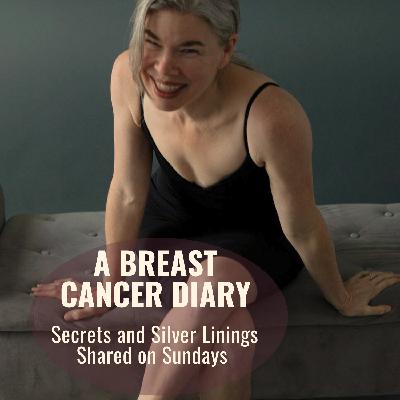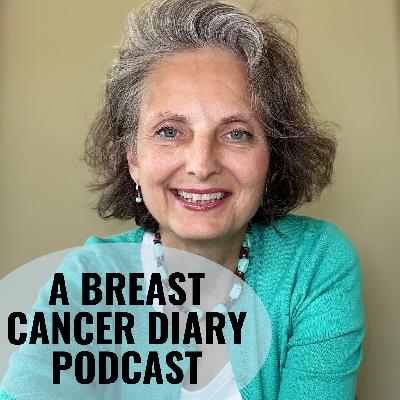STILL Ourselves after Mastectomy
Description
My instagram friend, Lisa, had a vision less than a year ago for a visual way to show the how the flat community has become a healing movement for women who don't want the usual reconstruction options post-mastectomy, and this week it is coming out into the breast cancer space as a work of art! I love that I can share the story of a vision come true and share it on the day before the end result comes into the world! Find Lisa's project on her website here:
https://project-still.me/
Transcript:
Kathleen:
My guest today is Lisa Sylvester. She lives in Richmond, Vermont, and I've been following her on Instagram for probably about a year now. We're fellow Flatties and proud of it. And she's the owner of a company called Interrobang Design. She and her husband run this company. Small business in Vermont, and it's a graphic design studio, and she has a new project coming out of this graphic design business that I'm so excited to talk to her about today. I haven't really dug in with her about it just because I wanted to save the conversation for the podcast. So this is really, truly fresh, new information that I'm super excited to hear about. Welcome Lisa!
Lisa Sylvester:
Hi. Thank you. Well, I'm happy to be here.
K:
You're a previvor. So Tell me a little bit about how you found out about your BRCA2 mutation
L:
Yeah. So I have been having breast cancer and ovarian cancer scares like throughout my adult life and my OBGYN worried about me and at one point she said, you know, what do you think about doing genetic testing just so we can know if we are really have something that we need to be aware of, uh, you know, could inform my healthcare kind of thing.
And I was like, yeah, let's, let's just find out. And I thought it was going to be negative. I don't really have a strong. Um, family history of cancer. In fact, no breast cancer history at all and only one, um, ovarian cancer, um, person in my family. Um, my genetic counselor thought it was going to be negative two.
Um, and so we were all surprised when we came back with a positive for BRCA2. Um, so I'm the first in my family to find out about it. which was the can of worms everybody warns you about with genetic testing because that meant I now had to inform my entire family about this new, new this news.
K:
And how long ago was that?
L:
That was three and a half years ago. And I was pretty, I'm pretty, I'm a research monger. So like when I found out about it, I was like, okay, what are we going to do about this? And I knew what my options were before I had my consultation with my, um, doctor and, and, um, it was my genetic counselor and an oncologist actually, and, um, they were surprised that I wanted a mastectomy.
They actually tried to talk me out of it because they said they're really good at catching cancer early. I thought, well, I don't actually want to catch it. I would rather like nip it in the bud if we can possibly. So I felt like, um, the mastectomy was the right choice for me. Um, and they also pushed implants right at that initial consultation. And I wasn't sure that that was right for me either. And when I told them I was interested in going flat, that set off alarm bells for them as well.
K:
Had you ever met anyone that had had a mastectomy?
L:
Um, so, um, interesting story, when I told my mom about this, she was in her 80s, and my mom is a total caregiver, she likes to help people feel better, uh, but she was, like, had some dementia, and hearing loss, and as I was talking with her, I wasn't sure she really knew what I was saying to her, um, but all of a sudden she got upset It's up and ran outside and started talking with her neighbor who was trimming her shrubs for her.
And she came back in and she said, Suzanne, my neighbor had a double mastectomy and she'd be happy to talk with you. So she didn't know how to me feel better herself, but she knew who to put me in connection with to do that. So she marched me out to the driveway conversation with this woman who I barely knew about mastectomies and she showed me her scars and, and we had a long talk about it and she was the first person I met. in real life that had had a mastectomy. My grandmother, my mother's mother, also had one in her forties, but I was told it was not because of cancer. And I learned from, again, healthcare professionals that back then it was not uncommon for women to have mastectomies for other reasons. Um, so she had a radical bilateral mastectomy and wore prosthetics after that.
K:
When Suzanne showed you her scars, was she flat chested or was she, did she have…?
L:
She was flat chested, but she wore prosthetics.
K:
How did you feel when you saw her scars?
L:
You know, I had been looking around online, so they kind of, I knew a little bit of what to expect and they kind of felt right in line with that. So I wasn't surprised really to see them. It was like confirmation. Maybe it was like, Oh, okay. Yes, this is indeed what this looks like.
K:
And how did you find the flat community for the first time? How long did that take?
L:
Um, it didn't take long. So I first found, um, photos. Of flatties, just on the internet, just random searches um, and then I found not putting on a shirt and actually use their surgeon, um, directory to find a surgeon and, um, and then I think I found the Instagram groups, um, and I was like, wow. Here it is. There's where all the answers are.
Yeah, it was pretty compelling. Because, you know, the, um, the story that we're fed, right, is that, um, women need to have breasts. That women, like, women and breasts go together, right? They're not separatable, if that's a word. But, um, that we can't be whole or healthy or beautiful without them.
And it was those women that I found on, um, Instagram, I told a very, very different story in them. I saw strength and empowerment and beauty and femininity and, um, confidence. And I was like, this is not that trope. This is something very, very different. it was super compelling. And I knew once I saw that, once I found that community, that that going flat was right for me.
K:
Did you find them using hashtags or just, did you stumble upon them accidentally or?
L:
Hashtags.
K:
Mm hmm. And describe for our listeners that haven't experienced this phenomenon. What does it look like? What did you see when you went on to these different accounts and saw photos of women that had gone flat?
L:
I saw an incredible amount of bravery. Um, people that were just sharing their truth with, um, pretense. So it was about showing exactly who they are, showing their bare chests, telling their true stories, um, without doctoring it up to look pretty. It wasn't like the perfect Instagram photo. They were raw and real um, and it was just very, very compelling.
K:
What are some of your favorite accounts that you remember from way back?
L:
Um, so “not in the pink” was one of the first ones—just a fashion icon and what's not to love.
Um, and then, um, I don't, I don't, I'm, I'm really bad at remembering people's handles. So I'm not going to be able to come up with a lot of others. But there were a handful that were sort of, um, very forward, meaning that they were just posting frequently.
So seeing a lot of their, their







